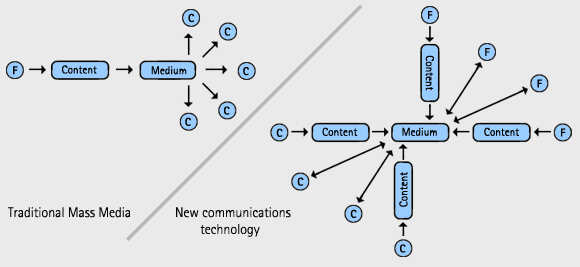|
Marketing is a dynamic discipline. It responds to changes in society,
technology, the economy and political pressure. Given rapid changes
over the last 40 years, there is no reason to believe that future
changes will be any less dramatic. Two areas in particular stand
out: new communications technology and increasing environmental
and social concerns.
New communications technologies
 |
| Jon
Weaver, Marketing Manager, Bournemouth
Borough Council |
|
 |
 |
| Stuart
Perl, Regional Director of Marketing
(EMEA), Cunard Line Seaborne Cruise Line. |
|
 |
The marketing that we are generally familiar with developed in
an era of mass communication (TV, Cinema, Radio, and newspapers).
Marketers exploited these media to increase awareness of the products
and services, and more recently to build brand images. Communication
was from a few organisations, to many individuals. But new communications
technologies (the Internet) allow for consumers to more easily
communicate directly with organisations and with each other. See
figure 2.1
| Figure 2.1 Changes to traditional communication models |
|
 |
The implications of the new interactive media environment are
still not well understood.
In addition, the physical distance between organisations and
many of their customers resulted in large numbers of intermediaries
(agents) who made money (and added value) by aggregating (collecting
together) a wide range of goods and/or services, then selling
them on to a large number of buyers.
Retailers do this of course, but there are also wholesalers and
distributors and in service marketing there are financial, travel
and insurance agents. The position of these intermediaries is
in question now that many organisations have direct access to
their customers via communications technology.
Environmental and social concerns
Marketing sometimes
has undesirable outcomes (see critique of this section). Most
extreme might be damage to the environment caused by non-biodegradable
packaging, petrol fueled cars, increasing air travel and tourist
resorts in sensitive areas. But also significant are concerns
about job losses as corporations move to countries with lower
wage costs (and less employee rights) and concerns about health
caused by the ingredients of many packaged and convenience foods,
for example.
For some then, the future challenge of marketing is to incorporate
social responsibility into the system of meeting consumer needs
profitably. Indeed, if marketing is to continue to flourish and
concerns over the concept are to be reduced, marketers must take
a longer term and broader view about their activities.
Marketing aims and objectives: a critique
It is easy to find criticisms of the outcomes of the
marketing process. Most of us will have had experiences of poor
service at a restaurant or hotel. Many of us will have been disappointed
with a product that we have purchased. There are also numerous
legal and self-regulatory bodies that we can turn to when dissatisfied
with organisations marketing activities. For example you can complain
to Trading Standards
if an organisation has ‘ripped you off’, or to the
Advertising Standards
Authority about a misleading ad. There are also ‘support
websites where you can share your poor experiences and get advice
about how to complain, for example Holiday
Travelwatch. So marketing is certainly not universally successful.
However these criticisms are usually about individual instances
– a failure of one organisation to successfully meet our
needs. We can console ourselves with the fact that the good thing
about marketing is that there is always choice – we can
take our business elsewhere next time.
Some critics note however, that the objective of many organisations
seems to be the elimination of competition – thus reducing
consumer choice. Worse than this, because organisations select
the markets that are most profitable, they can be accused of failing
to act in the broader interests of society (especially those in
society without money). There are now organised anti-brand and
anti-corporation movements, for example see the Corporatewatch
website.
And some observers are even more critical of the overall concepts
that underpin marketing. They highlight a central problem with
the idea of ‘need satisfaction’ – the fact that
consumers are never fully satisfied and that it would not be in
the interests of marketers to fully satisfy them (because they
would then stop buying new products and services). Marketing then,
is all about the endless creation of ‘false needs’.
Because marketing dominates the media and much of our physical
environment, anti-marketing discourses (discussions) seldom take
place. We are therefore trapped in a world of marketing, with
no real choice but to participate as consumers.
As a marketer, you need to be able to answer to these criticisms
on a personal level if you are to remain comfortable with your
actions. Why does so much marketing fail to meet needs? If marketing
has been successfully meeting needs for decades, why are so many
needs still unmet? If marketing is about meeting the objectives
of organisation as well as the consumers, is it not likely that
the organisation will tend to put its interests first?
|

